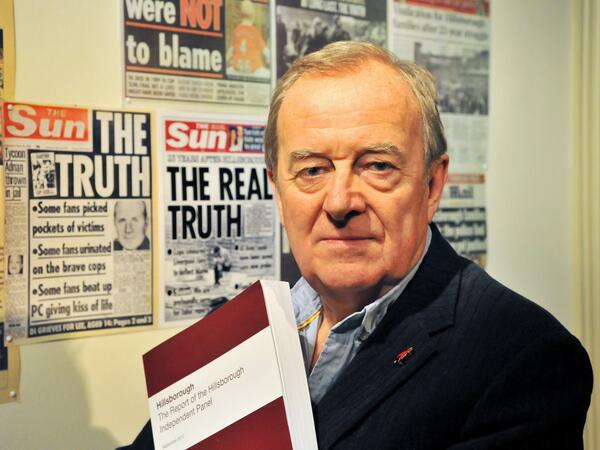In this article Phil Scraton recalls a defining month in the career of Boris Johnson that laid bare his deep-seated prejudices, disregard for factual accuracy and self-serving arrogance.
 On 7 October 2004 Ken Bigley, a civil engineer, was beheaded in Iraq by Islamic extremists. Just two days later a respectful silence was held in his home city, Liverpool. It was a death that resonated throughout the city and across the region, resulting in many public expressions of sympathy. In an editorial on 16 October 2004 the editor of the Spectator, Boris Johnson, condemned the ‘mawkish sentimentality of a society that has become hooked on grief and likes to wallow in a sense of vicarious victimhood’. He derided ‘according [Mr Bigley] the same respect offered annually to the million and a half British servicemen who have died for their country since 1914’.
On 7 October 2004 Ken Bigley, a civil engineer, was beheaded in Iraq by Islamic extremists. Just two days later a respectful silence was held in his home city, Liverpool. It was a death that resonated throughout the city and across the region, resulting in many public expressions of sympathy. In an editorial on 16 October 2004 the editor of the Spectator, Boris Johnson, condemned the ‘mawkish sentimentality of a society that has become hooked on grief and likes to wallow in a sense of vicarious victimhood’. He derided ‘according [Mr Bigley] the same respect offered annually to the million and a half British servicemen who have died for their country since 1914’.
Accepting that Mr Bigley had witnessed the decapitation of two fellow hostages, a fate to which he knew he was consigned, Johnson opined that a ‘sense of proportion’ had been lost. He dismissed the public, collective mourning of this single death as an ‘extreme reaction fed by the fact that he was a Liverpudlian’. The city shared a ‘tribal sense of community’, its people possessed by ‘an excessive predilection for welfarism’, reflecting ‘a peculiar, and deeply unattractive, psyche’.
Central to this generic pathological condition was, Johnson declared, the fact that ‘whenever possible’ Liverpudlians self-defined ‘as victims’. They ‘resent their victim status’, he opined, yet they ‘wallow in it’. A key element in their ‘flawed psychological state’ was a profound failure ‘to accept that they might have made any contribution to their misfortunes’. Liverpudlians, he railed, consistently ‘blame someone else’, thus ‘deepening their sense of shared tribal grievance against the rest of society’. On what foundation did Johnson build his scurrilous attack on the collective integrity of a city’s people?
Repeating Hillsborough lies
 Johnson’s calumnies came fifteen years after 96 men, women and children, many from Liverpool, were unlawfully killed at Hillsborough. The editorial continued that the ‘deaths of more than 50 Liverpool football supporters’ had been ‘undeniably a greater tragedy than the single death, however horrible, of Mr Bigley’. Yet, ‘that is no excuse for Liverpool’s failure to acknowledge, even to this day, the part played in the disaster by drunken fans at the back of the crowd who mindlessly tried to fight their way into the ground that Saturday afternoon’.
Johnson’s calumnies came fifteen years after 96 men, women and children, many from Liverpool, were unlawfully killed at Hillsborough. The editorial continued that the ‘deaths of more than 50 Liverpool football supporters’ had been ‘undeniably a greater tragedy than the single death, however horrible, of Mr Bigley’. Yet, ‘that is no excuse for Liverpool’s failure to acknowledge, even to this day, the part played in the disaster by drunken fans at the back of the crowd who mindlessly tried to fight their way into the ground that Saturday afternoon’.
Not content deliberately resurrecting the myths of drunkenness, hooliganism and violence that had dogged successive inquiries and investigations, Johnson laid bare his ignorance and prejudice, the twin characteristics of his lazy journalism. In his narrow mind the South Yorkshire Police had become ‘a convenient scapegoat’ and the Sun ‘a whipping-boy for daring, albeit in a tasteless fashion, to hint at the wider causes of the incident’.
According to The Sun ticketless fans had rushed the stadium, stolen from the dying, beaten up and urinated on a police officer who was administering first aid and verbally sexually abused a dying woman. Such unfounded allegations were not ‘tasteless hints’ but were lies orchestrated in the immediate aftermath and given credibility by the South Yorkshire Police Federation, senior police officers and the Sheffield MP Irving Patnick.
Returning to Mr Bigley, Johnson questioned why he had sought ‘to make a living by undertaking work in one of the most dangerous areas on the planet’. It had been a decision taken ‘against the express advice of the Foreign Office’. He had lived ‘with a pair of Americans’, seemingly ‘unconcerned about his personal security’. Mr Bigley’s choice, Johnson opined, should ‘temper the outpouring of sentimentality’.
Such mawkishness reflected a ‘form of behaviour’ that had been ‘kick-started in this country’ following the death of Princess Diana, a woman he considered ‘an even more ambiguous figure’. Apparently ‘more ambiguous’ than Mr Bigley. Johnson disparaged public expressions of collective grief as a ‘manifestation of our apparently depleted intelligence and sense of rationality’ together boding ‘extremely badly for this country’.
According to Johnson, this creeping malaise was rooted in twin conditions of ‘peace and welfarism’. Together they had delivered ‘a society where the blame and compensation cultures go hand in hand’, where ‘modern-day buccaneers seem determined to go about their activities not merely unprepared for the likely consequences, but indignant about them’. What had to be excised was ‘the cancer of ignorant sentimentality’. Johnson’s editorial was crass and hurtful.
Fake remorse
The public outrage that followed led the leader of the Conservative Party, Michael Howard, to insist that Johnson visit Liverpool to apologise. Johnson characterised his trip as a ‘penitential pilgrimage’. Having arrived in the city, his ‘heart in his boots’, he felt trapped in ‘a cold, damp three-star hotel’, afraid to venture out for fear of being ‘beaten up’. He could not bring himself to sign a book of condolence honouring Mr Bigley as it would be dismissed as ‘playing politics’. In Liverpool no-one was convinced of Johnson’s remorse.
His 23 October 2004 Spectator column was headed ‘What I should apologise for’. His dismissive tone, his casual ignorance – characteristically masked by occasional Latin asides that impress no-one other than contemporaries at the notorious Bullingdon Club – were evident in his crass representation of his reluctant trip as ‘Operation Scouse-grovel’. During the course of a ‘companionable and bibulous ceremony’, aka lunch, he had been castigated by the Spectator’s media editor for succumbing to political pressure to venture north. Johnson portrayed himself a ‘whipped cur’, granting his critic a ‘sizeable rise’.
Following the ‘firestorm of hate that had engulfed the Spectator’, Johnson mused that his Liverpool trip had given the impression of a ‘penitential pilgrimage at the behest of a party leader’. Demonstrating regret falling well short of remorse, he compounded his initial offensive behaviour. While, he mused, ‘welfare-addicted Liverpudlians’ might well exist, it had been ‘wounding and wrong to suggest that this stereotype’ was applicable across the city. Further, it had been ‘sloppy to repeat the old canard that the Hillsborough tragedy was caused by drunken fans’.
Yet Johnson steadfastly refused to accept that his editorial had been wholly inaccurate and offensive. Such a climb-down ‘would require me to perform a kind of auto-prefrontal lobotomy’. He defended the central premise that ‘bogus sentiment, self-pity, risk’ generated a shared ‘refusal to see that we may sometimes be the authors of our misfortunes’. The public expressions of grief at the deaths of Mr Bigley and the 96 at Hillsborough together reflected the ‘tendency to blame the state’.
Reactionary tropes
The meaning of Johnson’s broadside now became clear. We live, he wrote, at a time when ‘means-tested benefits multiply, and where good human emotions and affections that might once have been directed towards neighbours and family are now diverted into outbursts of sentimentality’. Warming to his reactionary theme he reiterated the reactionary tropes that since have remained his stock-in-trade at Tory Party conferences.
 Collectively ‘we’ eagerly ascribe to ourselves ‘victim’ status inducing an ‘increasingly hysterical health-and-safety compensation culture’. He condemned journalists as ‘scaremongers’, politicians ‘cowards’ and judges ‘muddled’. Johnson’s parting shot was to ‘heartily and sincerely apologise for offence caused’ and ‘for the tasteless inaccuracies with which the point was made’. Yet the ‘point’, he asserted, remained valid.
Collectively ‘we’ eagerly ascribe to ourselves ‘victim’ status inducing an ‘increasingly hysterical health-and-safety compensation culture’. He condemned journalists as ‘scaremongers’, politicians ‘cowards’ and judges ‘muddled’. Johnson’s parting shot was to ‘heartily and sincerely apologise for offence caused’ and ‘for the tasteless inaccuracies with which the point was made’. Yet the ‘point’, he asserted, remained valid.
Behind a veneer of class privilege Boris Johnson is neither buffoon nor intellectual. Successive political gaffes and economic failures as London’s mayor or as the state’s foreign secretary, mega-lies proclaimed on Brexit hoardings and the ‘battle-bus’, profoundly offensive comments directed at victims and survivors alongside his numerous personal indiscretions, reveal a whited sepulchre. Weak on detail, careless with facts and consistently insincere, fifteen years on from his Liverpool sojourn his crass insensitivity and provocative outpourings continue undiminished.
Phil Scraton is Emeritus Professor, School of Law, Queen’s University Belfast, primary author of the Hillsborough Independent Panel’s Report, author of Hillsborough: The Truth. He holds the Freedom of the City of Liverpool.


Thanks for finally writing about >Boris Johnson: Liverpool, lies and
bigotry | Institute of Race Relations <Loved it!
In the round, there are decent points made here. And Boris Johnson is certainly a questionable character to say the least. However, the article is sadly, in my view irrevocably damaged by being based upon a false claim – that Boris Johnson wrote the famous ‘Bigley editorial’. He did not and its actual author, Simon Heffer, has admitted to it. The editorial itself is a leading article and, as Spectator leading articles have traditionally, carries no byline. In the account of the Bigley affair in Andrew Gimson’s biography of Johnson former Spectator staff confirm that the piece was written by Heffer and before publication the only editorial input the article received was being subedted by an assistant editor who removed some especially unpleasant personal things that Heffer had written about the late Ken Bigley. That Johnson did not even read the articles in a magazine he was ostensibly editing tells its own story.
‘Irrevocable damage’? Hardly. I guess we will never know the full story regarding the Heffer/ Johnson relationship to this article. I am fully aware that the former stated that he penned it. Obviously, as an Editorial, it carried no byline but as Editor Johnson was impelled by his Party leader to accept full responsibility for its content – which he did – and make the Liverpool trip. In his act of contrition article, written under his name, he did not seek to offload responsibility onto Heffer but stood over the Editorial as the NS Editor. Whoever wrote the Editorial, whatever the subsequent claims made about it, Johnson was responsible for its publication.
Regarding Heffer. Responding in 1990 to LJ Taylor’s Interim Report on Hillsborough and under the headline, ‘BLAME THE HOOLIGANS, NOT THE STADIUMS’, he wrote:
‘The problems at Hillsborough, though Taylor was reluctant to say it, was one of hooliganism. However much it may outrage Liverpool, 95 Liverpool fans were killed by the thuggishness and ignorance of other Liverpool fans crushing into the ground behind them. It serves no purpose to prevent the fans who caused the crush from facing that responsibility.’ (Sunday Telegraph, 4 February 1990).
A timely piece amid the nauseating sycophancy and back-slapping that we’ve become accustomed to when “BoJo” is being discussed in the media. Even that cringe-worthy nickname is intended to present him as some kind of affable clown – colorful but harmless.
Alas, I see this bigot is now lending his support to another tawdry campaign of the Sun, that to prevent those who committed appalling crimes during the war in Ireland from being prosecuted. So much for “liberal democracy”, “due process” and the “rule of law”.
It says a lot – and not in a good way – about Britain, that this ignoramus is the verge of becoming its leader.
Peter Fell is correct – if you are fully aware that someone else has admitted to writing the editorial, why state that Boris Johnson wrote it?
Hello Alex, You did not read my comment. I am ‘fully aware’ that Heffer ‘stated’ he wrote the editorial and we have no way of knowing the reliability of the claim. So, repeating myself: Johnson was the Editor, he accepted full responsibility for the Editorial and, accordingly, was held to account by his Party leader. It was he who went to Liverpool to attempt to make amends. It was he who wrote the subsequent article in his name, not only taking responsibility for the Editorial but also denying its offensiveness. Thank you for contributing on this but, with respect, I think you are missing the point …
Thank you for writing this Phil, and for forensically taking apart Johnson’s views on the murder of Ken Bigley and the responses of Mr Bigley’s home city. I’m not sure why people are obsessing on who actually wrote the words in the original article; the views expressed are those of Johnson either way, as he has clearly acknowledged.
Thanks for this Phil! Great to see a counter discourse to Johnson’s lovable rogue media persona. Words have impact and what are characterized as his many ‘gaffes’ by media outlets are actually a series of deeply bigoted, classist poison darts. As for the above – it is usual for editors to take ownership of editorials, as occurred in this case.
Thanks for this great article Phil.
As a survivor of Hillsborough I have grown well used to attacks on my home city.
With Boris in the media at the moment so much. My mind was cast back to this time, 2004, Boris attacks on the people of Liverpool. I remembered the hurt felt at the time and since.
Boris like many have views which are based on lies.
But guess what we were right and you were wrong.
As the longest inquest in British history has proved.
I guess some people just don’t like to be told they were wrong.
Phil you have always spoken up for truth and justice.
Unlike Boris
Thanks again Phil.
Keep up the good work.
I don’t think I have missed the point. If an undergraduate were to quote someone who had written a chapter in a book and then reference the editor as the source that would be marked down for inaccuracy. I don’t see what the difference is here.
Thank you for the response Phil. The (vile) quotes you have posted from Heffer are further evidence that Heffer wrote the article. Heffer fessed up at far back as 2004, not long after the article was published. He has form on Liverpool, has written about various parts of non-SE England in the same fashion, and the writing style of the article is clearly Heffer’s and not Johnson’s. Gimson’s biography also points out that Johnson’s brand of dated laboriously un-PC Clarksoneque 1990s jocularity is never actually hateful or spiteful. Heffer’s article on the other hand was soaked in venom.
You are also not understanding the point about editorial responsibility. Boris Johnson was editor of the Spectator. A magazine’s or newspaper’s editor is indeed responsible for the uncredited editorials they publish. You’d hope therefore that editorials were the one type of article that an editor would read personally even if it is not possible for them to read everything hemselves. That’s what subeditors, assistant editors, etc., are for.
However, in this case the Spectator’s editor was the infamously slapdash Boris Johnson, who at this time at least least three other jobs, as MP for Henley, Telegraph columnist and shadow minister, as well as his various extracurricular activities. So, no, he didn’t read the article nor edit its text before publication. If you read his various biographies you’ll find quotes from former Spectator staff, some of whom with no reason to make excuses for him, who describe the sequence of events. There isn’t any controversy about what happened. In fact, while what actually happened gets him off the hook for the bigotry of Heffer’s editorial they reveal at the same time his dilettante nature.
Even though his negligence had given rise to the controversy over the article, he as editor did have responsibility for it. So the fact that he didn’t try to dissociate himself from the article and back-heel the blame to its author Heffer is actually to Johnson’s credit. About the only thing about this affair he comes out of with any credit. By taking responsibility he was not endorsing its content as he explicitly withdraw its comments about Liverpool in an article you have decided to digest in a very partial and misleading fashion.
I’m very far from being a fan of Boris Johnson and so this sort of deliberate obfuscation in pursuit of what appears to be a party political motive is all the more annoying. It takes a lot to make the dubious Johnson the sinned-against party. Liverpool fans’ and they city as a whole’s position on Hillsborough has been impeccable. The truth is now accepted by most. This misleading article can only undermine this victory and gives malicious people an ‘in’.
Here is the full paragraph in Johnson’s Spectator column, following on from the publication of Heffer’s Bigley editorial, in which he expresses his disagreement about its comments on Liverpool. One can dislike Johnson’s glib style and weakness for joviality as a distraction from very real and even tragic subject matter. But that’s him and how he writes and speaks. However, judged fairly unlike Heffer’s poisonous editorial its content is far from unreasonable and has not been fairly represented in the above article:
“All I ask of my old friend [Spectator write Andrew Glover] is what exactly it is that he thinks Johnson the politician is doing that betrays the integrity of Johnson the journalist. In the course of his Mail piece, Glover attacks last week’s Spectator editorial for its unwarranted slurs on the people of Liverpool. He says it was tasteless to drag in the Hillsborough tragedy, and that we should have got our facts right about this appalling event, in which 96 people died. He is right, and the only question is why he thinks it necessary to attack me for agreeing so exactly with his views. It may be that there are welfare-addicted Liverpudlians who answer to the characteristics we described in the leader but it was wounding and wrong to suggest that this stereotype could be applied to the city as a whole. It was sloppy to repeat the old canard that the Hillsborough tragedy was caused by drunken fans, when the inquiry report found no evidence for this whatever. To judge by the huge mail I have received, that mistake caused real offence and hurt. Faced with such anger, any editor would feel obliged to make amends, and that is what I do now.”
Ref: http://archive.spectator.co.uk/article/23rd-october-2004/16/what-i-should-say-sorry-for.
My goodness … an argument over who penned an editorial.
I wasn’t writing about Heffer which is why his 1990 piece is not there – I have already written about him elsewhere in the two Hillsborough Reports in 1990 and 1995 and again in my book Hillsborough: The Truth. I understand fully editorial responsibility having edited many books and special issue journals. The book parallel is false, as an undergraduate or anyone else is certain of the identity of the editor and of the authors and of their distinct responsibilities.
How else can I put this without repeating myself? The piece was an Editorial, Johnson was the Editor, Johnson was held responsible by his Party leader and accepted responsibility, hence his trip to Liverpool and his subsequent article which compounded the issue. Sometime later Heffer affirmed responsibility. I know this. Yet we only have his word for it, supported by others around the Spectator. So, Johnson’s ‘glib style and weakness for joviality as a distraction from very real and even tragic subject matter’ is set against the ‘poison’ of Heffer. Johnson also has a reputation for playing fast and loose with the truth and demonstrating crass, possibly deliberate, insensitivity towards others. Nazanin Zaghari-Ratcliffe would be a current example of this.
Back to the main point of the article. It is in the last paragraph. Finally, Peter, your comment that ‘this sort of deliberate obfuscation in pursuit of what appears to be a party political motive is all the more annoying’ is as inaccurate as it is presumptive. As you might or might not know, I am a part of the ‘city as a whole’. This is the first time anyone has questioned my motives regarding Hillsborough as anything other than supporting bereaved families and survivors in their long struggle for truth, justice and acknowledgement. One thing for sure, throughout the thirty years party political affiliation was the last thing on our minds.
I will leave it to others to conclude why and by what means, the ‘truth is now accepted by most’.
In 2004 the Rt Hon Boris Johnson MP as Editor of the Spectator published the controversial James Michie poem This started with the line ‘The Scotch-what a verminous race…’, and it went on to say all Scots North of the border should be penned in ghettos to face ‘comprehensive extermination’.
Michie was calling for the extinction of all those polluted by Scottish blood. At the time the Prime Minister Tony Blair, the Chancellor Gordon Brown, the Lord Chancellor and even the Speaker of the Commons Michael Martin were all Scottish. The poem advocates that together with all the other Scottish MPs they should be targeted for liquidation as part of a programme of ethnic cleansing at Westminster.
The poem published by Mr Johnson in the ‘Spectator’ called for a Nazi style genocide of more than five million Scottish men, women and children. If carried out as proposed it would also have included 6,000 Scottish Jews. They would be rounded up, penned in ghettos and exterminated. The poem was proposing not just a Scottish genocide but calling for Hitler’s attempted extermination of European Jews to be restarted in Scotland. The poem ‘Friendly Fire’ is racist clearly anti Semitic and advocates the slaughter of a thousand Scottish Jewish children.
Several internet sites claim that the Michie poem had been removed from the Spectator’s Archive site but this was is not correct. At least the relevant page from the Issue dated 14th August 2004 could still be seen on the Spectator’s Archives in September 2019 and still be seen at the start of this month. (About a week ago the Archives were put behind a paywall of sorts and restricted to account holders.)
As Editor at the time our PM was presumably responsible for the publication of Michie’s poem with the proposal for the slaughter of more than one million Scottish children and of five million Scottish adults who are described in the poem as ‘tartan dwarves’ .
This would look superb on the CV of someone intending to start a new Nazi Party.
I do not think that Boris has ever apologised for publishing Michie’s work even though it called and still calls for the extinction of the entire Scottish Nation in a genocidal programme of ‘comprehensive extermination.’
The Michie poem Friendly Fire was discussed in an article by Harriet Sherwood in the Sunday Observer in August 2019;
https://scramnews.com/boris-johnson-racist-snp-mp-ian-blackford/
In her article it was stated that the poem published by Boris Johnson the Editor had been removed from the Spectator’s archives but in September and October of this year(2019) the 2004 August 14th issue, together with a digital image of page 20, could clearly be seen on their internet archive.
The poem Friendly Fire was also displayed and discussed in the Scottish newspaper the Herald in 2004.
https://www.heraldscotland.com/news/12421260.outrage-at-spectators-poetic-attack-on-scots/
Perhaps the police should take a fresh look at it. It calls the Scots a ‘verminous’ race and proposes the penning in ghettos and murder of around 6,000 Scottish Jews.